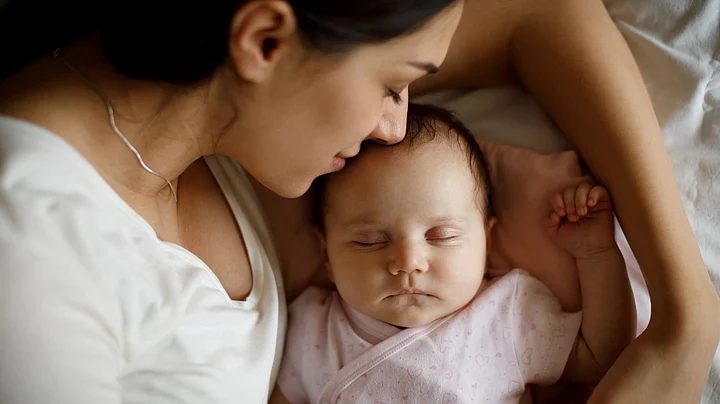The many highs of parenthood are punctuated by several speed bumps, as every been-there-done-that parent will tell you. Watching your baby snooze peacefully is one of those truly special highs.
But then, we know by now that your child’s sleep journey isn’t going to be all smooth sailing. It’s our job to tell you that it is always best to be prepared for the bumps along the journey and not despair when confronted with them.
Because when you despair, you look for quick solutions to what you assume is some sort of a sleep crisis. It’s at this point that you may fall for misleading advice that is usually floating all over the web and in parenting circles to ‘fix’ your baby’s wakings.
Anything to get more sleep, right?
But not all advice is aligned with the complex realities of biologically appropriate child sleep. No matter where you live, you would have heard variations of well-meaning suggestions from friends, family and foes that sound like the following:
Don’t let your baby fall asleep at the breast while feeding.
Babies will fall asleep on their own when they are tired.
Don’t let your baby sleep in your arms.
Babies who nap less in the day sleep better at night.
Feed your baby lots of solids at dinner so she sleeps through the night.
Let your baby get used to sleeping with loud noises and bright lights so that he can fall asleep anywhere at any time.
Let your baby cry, that’s how they learn to sleep on their own!
These are complete myths that go against logic and sleep science and end up creating more trouble and disassociation between parent and child.
Yet, they have been passed down generations, and repeated so very often by millions of people around the world, that they are routinely taken to be the ultimate truth and not questioned as often as they should.
New parents, typically, are vulnerable to these myths masquerading as the truth because they come wrapped as helpful advice from well-wishers, often legitimized by the medical community.
If you have fallen for such advice, there is no need to feel guilty. We all have, in one way or the other and you are certainly not alone.
Sleep myths are popular and commonplace and have made themselves so much at home in our daily lives over many centuries that it’s very hard for a new parent to separate fact from fiction, especially in the absence of awareness about why babies sleep the way they do.
But these myths, when implemented, can play havoc with a child’s growth and relationship with sleep.
The Long Life of Sleep Myths
The main reason sleep myths continue to thrive, despite research to prove them otherwise, is because most parents find it hard to accept that healthy, age-appropriate sleep is often not linear and doesn’t look like what you imagine it would.
Ask any parent what they wish for most and it’s likely they will say, ‘A good night’s sleep!’ or ‘My baby sleeping through the night!’ When that doesn’t happen, they turn to a certain brand of sleep solutions that are actually just myths.
Evolutionary biology ensures that babies and toddlers continue to wake through the night for their survival till they are neurologically ready to fall back asleep on their own without much assistance.
So, an uninterrupted night’s sleep is not likely to happen in the first few years of your child’s life. Once you accept it, it gets easier, and your body too begins to adapt.
As a new mother or father, you are frequently given to believe that you’re failing when you realize your child can’t sleep without your touch or a feed or a walk and end up attributing these natural associations to something you’re doing wrong, or a ‘habit’ that you believe you might have inadvertently let your child fall into.
To be clear, you are not failing and you haven’t done anything wrong.
The truth is this: babies have needs, and these ‘habits’ are necessary and not to be looked down upon. Babies cannot be spoilt or pampered enough. They need to be held close to a caregiver for long periods in the first few months.
They need to breastfeed to sleep or be cradled and held close if the baby is on formula milk or bottle feeds.
They need help in bridging sleep cycles, which means caregivers need to rock, nurse, walk or pat them back to sleep whenever they stir, till the time they are neurologically ready to go back to sleep themselves like adults.
Requiring your closeness or assistance to sleep are not ‘bad habits’, but biologically appropriate requirements to grow and thrive. This is how children are meant to sleep. Any advice that suggests otherwise amounts to a myth perpetuated by someone who doesn’t understand baby sleep science and biological needs
(This is an excerpt from Sleeping Like A Baby written by Himani Dalmia and Neha Bhatt and published by Penguin Random House. Himani Dalmia is a Certified Infant and Child Sleep Specialist and co-founder of the support group, Gentle Baby Sleep India. Neha Bhatt is an award-winning journalist who reports on public health, human rights, gender and education.)

